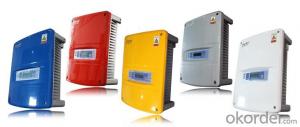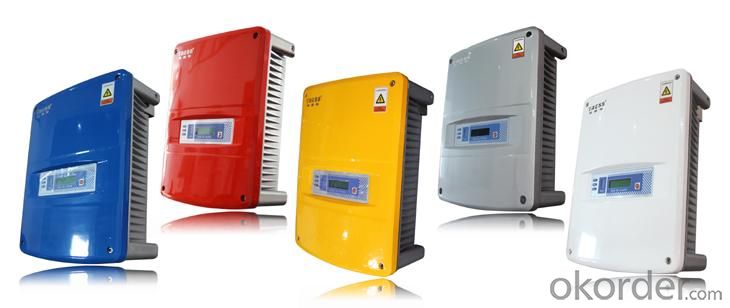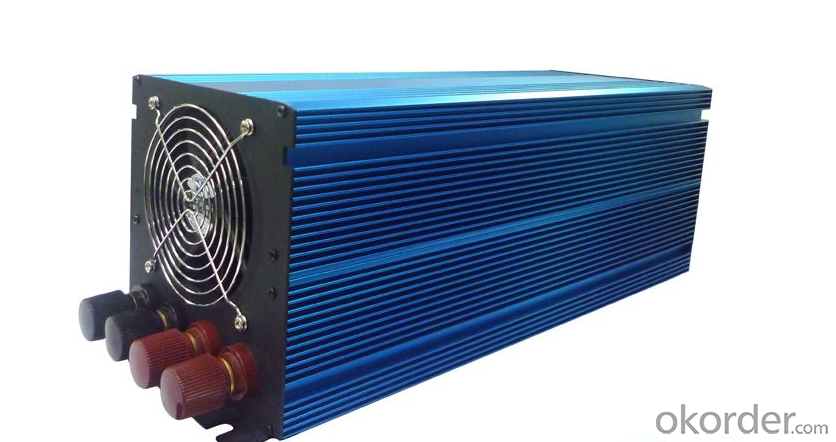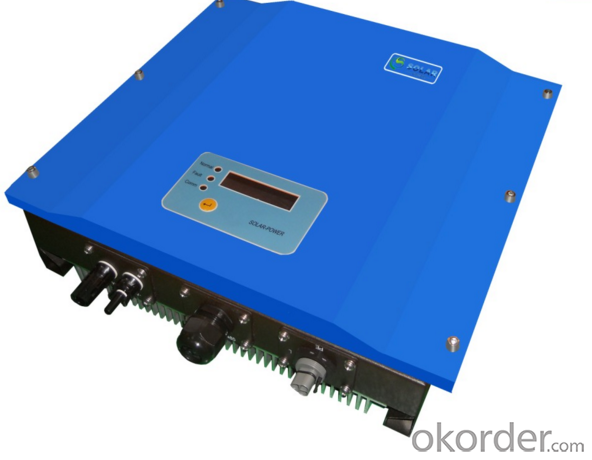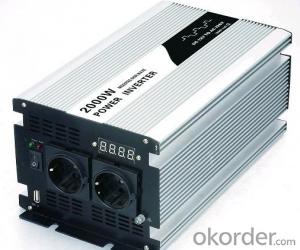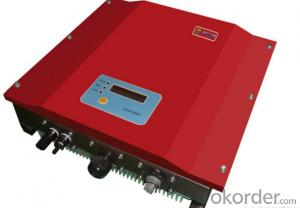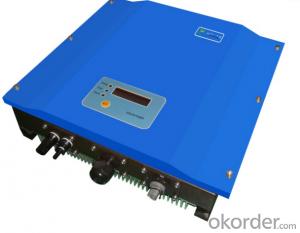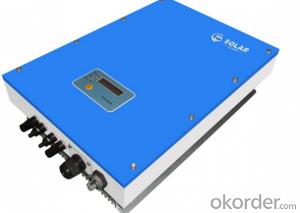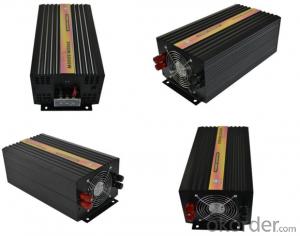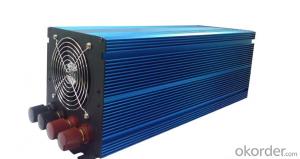200 Watt Three Phase 9k Solar Inverter Made in China
- Loading Port:
- Shanghai
- Payment Terms:
- TT OR LC
- Min Order Qty:
- 0 watt
- Supply Capability:
- 10000 watt/month
OKorder Service Pledge
OKorder Financial Service
You Might Also Like
Description of Three Phase 9k Solar Inverter
Solar ac power system consists of solar panels, charge controllers, inverter and battery; Solar energy does not include inverter dc power system. Inverter is a kind of power conversion device, inverter by incentives can be divided into self-excited oscillation inverter and separately excited oscillation inverter.
Features of Three Phase 9k Solar Inverter
Standard 10 years warranty, 5-15 years optional
Built-in Gprs as option
Built-in Wifi as option
External Inductor
Smaller and lighter, only 22kg
High performance DSP for algorithm control
VDE-AR-N 4105 certification
New topology design
Dual MPPT design
IP65 waterproof and dustproof level
Multi-button touch interface
LCD screen visible at night
Have anti-shading function
Advantages of Three Phase 9k Solar Inverter
Longer life cycle
Plug and play
Free monitoring through our webportal
Very lower internal temperature
Easy transportation and installation
Faster CPU speed
Adjustable active and reactive power
Maximum conversion effciency up to 97.6%,Euro up to 96.8%
More flexible system design
Maximized system profit
User friendly operation
24 hour operation data readable on screen
Suitable to complex installation environment
Technical Data of Three Phase 9k Solar Inverter
| Type | Omniksol-8k-TL2 |
| Input(DC) | |
| Max.PV Power | 9000W |
| Max,DC Voltage | 1000V |
| Nominal DC Voltage | 640V |
| Operating MPPT Voltage Range | 150-800V |
| MPPT Voltage Range at Nominal Power | 360-800V |
| Start up DC Voltage | 250V |
| Turn off DC Voltage | 150V |
| Max, DC Current(A/B) | 14A/14A |
| Max, Short Cicuit Current for each MPPT | 20A/20A |
| Number of MPP trackers | 2 |
| Max, Input Power for each MPPT* | 5000W |
| Number of DC Connection | A:2/B:2 |
| DC Connection Type | MC4 connector |
| Output(AC) | |
| Max,AC Apparent Power | 8100VA |
| Nominal AC Power (cos phi = 1) | 8100W |
| Nominal AC Current | 11.7A |
| Nominal AC Voltage | 3/N/PE;220/380V |
| 3/N/PE;230/400V | |
| 3/N/PE;240/415V | |
| Nominal Grid Frequency | 50Hz/60Hz |
| Max, AC Current | 13.8A |
| Grid Voltage Range** | 185-276V |
| Grid Frequency Range** | 45-55Hz/55-65Hz |
| Power Factor | 0.9 capacitive... 0.9 inductive |
| Total Harmonic Distortion(THD) | <2% |
| Feed in Starting Power | 30W |
| Night time Power Consumption | <1W |
| Standby Consumption | <10W |
| AC Connection Type | Plug-in connertor |
| Efficiency | |
| Max,Efficiency | 97.6% |
| Euro Efficiency | 96.8% |
| MPPT Efficiency | 99.9% |
| Safety and Protection | |
| DC Insulation Monitoring | Yes |
| DC Switch | Optional |
| Residual Current Monitoring Unit (RCMU) | Integrated |
| Grid Monitoring with Anti-islanding | Yes |
| Electricity Fuse Protection | Yes |
| Protection Class | Ⅰ(According to IEC 62103) |
| Overvoltage Category | Ⅲ(According to IEC 62109-1) |
| Reference Standard | |
| Safety Standard | EN 62109, AS/NZS 3100 |
| EMC Standard | EN 6100-6-1, EN 6100-6-2, EN 6100-6-3 EN 6100-6-4, EN 6100-3-2, EN 6100-3-3 |
| Grid Standard | VDE-AR-N4105. VDE-0126-1-1,G83/1,EN 50438,RD1699,CEI 0-21, AS4777,C10/C11 |
| Physical Structure | |
| Dimensions | 352x421x172.5mm |
| Weight | 22kg |
| Environmental Protection Rating | IP 65 (According to IEC 60529) |
| Cooling Concept | Natural convection |
| Mounting Information | Wall bracket |
| General Data | |
| Operating Temperature Range | -25℃ to +60℃(derating above 45℃) |
| Relative Humidity | 0% to 98%, no condensation |
| Max. Altitude (above sea level) | 2000m |
| Noise Type | <40dB |
| Isolation Type | Transformerless |
| Display | 20 x 4 LCD (800x480 TFT Graphic Display optional) |
| Data Communication | RS485(WiFi, GRPS optional) |
| Computer Communication | USB |
| Standard Warranty | 10 Years (5-15 years optional) |
IMages of Three Phase 9k Solar Inverter
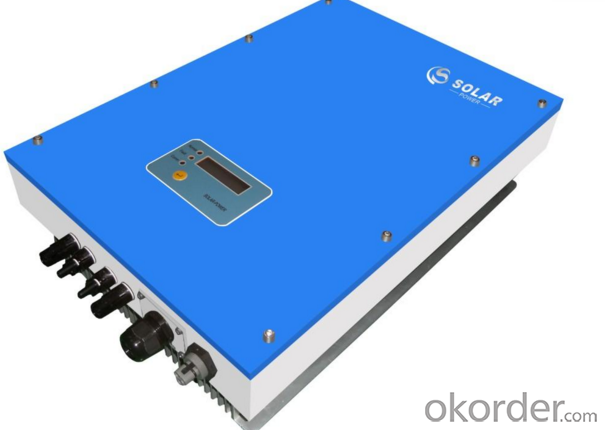
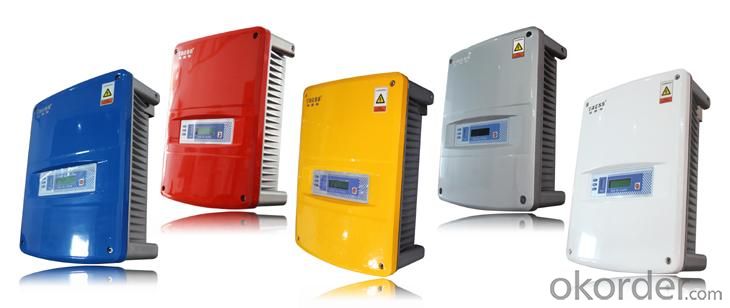
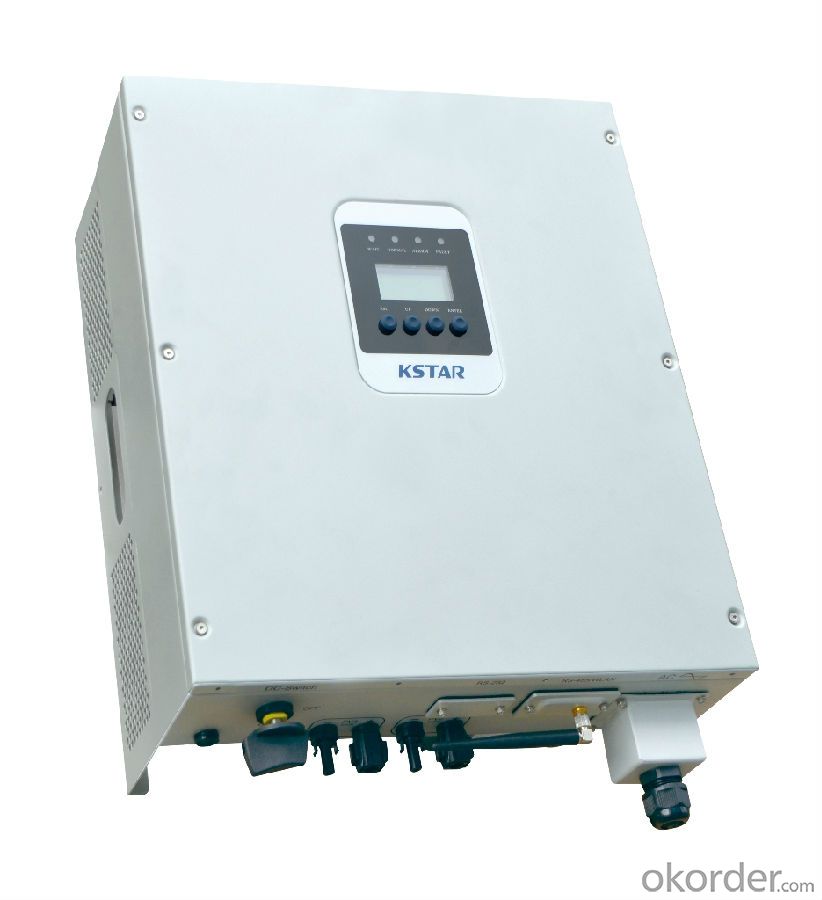
FAQ
Q: Do you have the CE, TUV, UL Certification?
A: We’ve already passed all the tests, and any certificate is available.
Q: Have you ever sold your products to companies in my country?
A: Of course, we have customers in all general PV markets, but I think we should expand our market share along with the market growth.
Q: When did your company set up? You are a new company, how can I believe your quality?
A: We entered into Solar PV industry in 2005, now we have several plants in manufacturing of a-Si and c-Si panels, and our capacity is 220MW per year. Till now we have already passed all the tests by authorized laboratories, e.g. TUV, CE, UL.
Q: Can you help us install the module if we cooperate with you?
A: We haven’t entered into installation sector, but we have the plan in near future.
Q: How do you pack your products?
A: We have rich experience on how to pack the panels to make sure the safety on shipment when it arrives at the destination.
Q: Can you do OEM for us?
A: Yes, we can.
Q: Can we visit your factory?
A: Surely, I will arrange the trip basing on your business schedule.
- Q: Can a solar inverter be used in areas with unstable power grids?
- Yes, a solar inverter can be used in areas with unstable power grids. Solar inverters are designed to convert the direct current (DC) produced by solar panels into alternating current (AC) that can be used to power homes or businesses. In areas with unstable power grids, the solar inverter can help stabilize the electricity supply by converting the solar energy into usable AC power, independent of the grid's stability. Additionally, some advanced solar inverters come with features like grid-tie functionality, battery storage, or grid support functions that further enhance their ability to adapt to unstable power grids.
- Q: How does a solar inverter handle grid synchronization during startup?
- During startup, a solar inverter handles grid synchronization by first ensuring that the grid is stable and within acceptable voltage and frequency ranges. It then synchronizes its output voltage and frequency with the grid by monitoring its phase angle and adjusting it accordingly. This synchronization process allows the solar inverter to safely and seamlessly connect to the grid, ensuring smooth power transfer and operation.
- Q: What is the maximum power rating of a solar inverter?
- The maximum power rating of a solar inverter can vary depending on the specific model and manufacturer. However, typical residential solar inverters have power ratings ranging from 1,000 to 10,000 watts, while commercial and utility-scale inverters can have ratings exceeding several hundred kilowatts or even megawatts.
- Q: What is the role of a grid protection relay in a solar inverter?
- The role of a grid protection relay in a solar inverter is to monitor the performance and safety of the grid connection. It helps to ensure that the solar inverter operates within the specified parameters and protects the grid from any potential issues such as overvoltage, undervoltage, or frequency deviations. The relay acts as a safeguard by quickly disconnecting the solar inverter from the grid in case of any abnormalities, preventing any damage to the inverter or the grid itself.
- Q: How does a grid-tied solar inverter work?
- A grid-tied solar inverter converts the direct current (DC) electricity generated by solar panels into alternating current (AC) electricity that can be fed into the electrical grid. It synchronizes the solar panel's electricity with the utility grid's electricity, allowing the excess power to be sent back to the grid or drawing power from the grid when the solar panels are not producing enough. The inverter also ensures the safety and reliability of the system by monitoring the grid's voltage and frequency, and disconnecting in case of grid failure to protect workers and prevent damage to the system.
- Q: Can a solar inverter be used with solar concentrators?
- Yes, a solar inverter can be used with solar concentrators. Solar concentrators focus sunlight onto a smaller area, increasing the intensity of the light. The solar inverter's primary function is to convert the DC power generated by the solar panels into AC power suitable for use in homes or businesses. Therefore, it can still be used to convert the enhanced DC power generated by solar concentrators into usable AC power.
- Q: How do you troubleshoot common issues with a solar inverter?
- To troubleshoot common issues with a solar inverter, start by checking the connections and ensuring they are secure and undamaged. Verify that the DC input and AC output are receiving power properly. If there is no power, check the circuit breakers and fuses. It's also important to inspect the solar panels for any shading or debris that may affect their performance. Additionally, reviewing the error codes or indicators on the inverter can provide valuable insights into the problem. If the issue persists, consulting the manufacturer's manual or contacting a professional solar technician would be recommended for further troubleshooting and repair.
- Q: Can a solar inverter be used in areas with unstable grid power?
- Yes, a solar inverter can be used in areas with unstable grid power. Solar inverters are designed to convert the DC power generated by solar panels into AC power for use in homes or businesses. In areas with unstable grid power, a solar inverter can help stabilize the electricity supply by utilizing the solar energy generated. It can operate independently or in conjunction with the grid, providing a reliable power source even during grid outages or fluctuations.
- Q: How does a solar inverter handle partial shading on solar panels?
- A solar inverter handles partial shading on solar panels by employing a technology called Maximum Power Point Tracking (MPPT). MPPT allows the inverter to continuously monitor the voltage and current of each individual solar panel, and adjust the operating point of the panels to maximize power output. When shading occurs on one or more panels, the inverter adjusts the voltage and current of the unshaded panels to compensate for the reduced power output, ensuring the overall system performance is optimized.
- Q: Are there any safety considerations when installing a solar inverter?
- Yes, there are several safety considerations when installing a solar inverter. Firstly, it is important to ensure that the installation is done by a qualified professional who has the necessary knowledge and expertise. Additionally, proper grounding and electrical connections should be established to minimize the risk of electric shocks or fires. Adequate ventilation and protection from moisture should also be provided to prevent overheating and damage. Lastly, it is crucial to follow all manufacturer's instructions and local building codes to ensure a safe and compliant installation.
Send your message to us
200 Watt Three Phase 9k Solar Inverter Made in China
- Loading Port:
- Shanghai
- Payment Terms:
- TT OR LC
- Min Order Qty:
- 0 watt
- Supply Capability:
- 10000 watt/month
OKorder Service Pledge
OKorder Financial Service
Similar products
Hot products
Hot Searches
Related keywords
